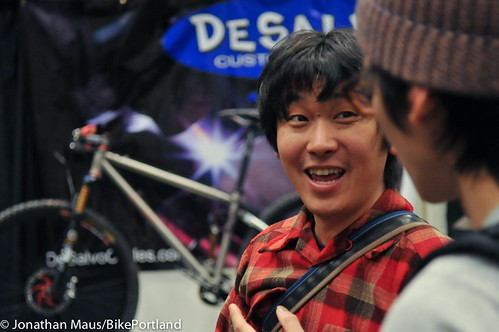
The U.S. handmade bicycle industry has an Ambassador to Japan and his name is Shinya Tanaka.
“In Japan there are many builders but they are only making keirin frame… Sometime I ask them to make a commuter [frame] and their face is like, ‘What!?'”
In the past few years, Tanaka, the 38-year-old owner of Circles bicycle shop in Nagoya, has melded his passion for handmade craft and love of bicycling into a healthy business importing handmade bicycle frames from a select crop of builders in Northern California and Oregon.
Since 2005, Tanaka has staked out an impressive niche. He is the go-to guy for high-quality, U.S. made steel bicycles and he’s tending a blooming bike culture that has taken root at his bike shop.
Ask Cielo Cycles‘ Jay Sycip how business is going and the first thing he’ll mention is their strong sales to Japan. “Japan” in Cielo’s case means Mr. Tanaka. Sycip says that in 2011, Tanaka bought more of their bikes than anyone else. Same goes for Napa, California-based Retrotec-Inglis Cycles. According to veteran builder Curtis Inglis, Tanaka is his largest wholesaler. Other builders that have gained Tanaka’s business are Hunter Cycles and Sycip Bikes.
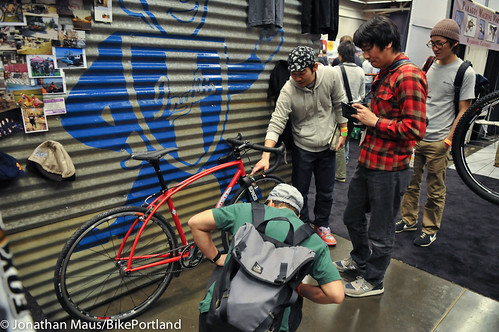
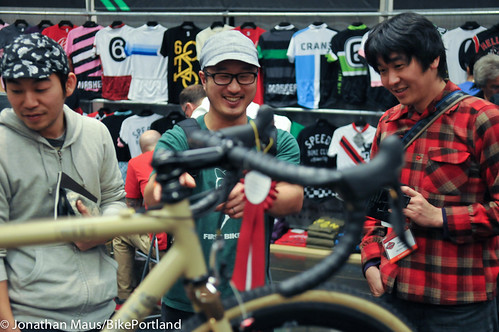
Veteran Santa Cruz-based builder Rick Hunter has even traveled to Tanaka’s shop to do brazing demos and meet his customers in person (read more about his trip in the latest issue of Paved magazine).
“He’s building a culture around handmade bikes.” says Cielo’s Sycip (not to be confused with his brother Jeremy who owns Sycip Bikes).

Tanaka’s shop, the Santa Cruz-based
builder recently visited Nagoya to
meet his customers face-to-face.
For Tanaka, this Japan-U.S.A. connection started back in 2006 when he visited the North American Handmade Bicycle Show in San Jose, CA; but his love of handmade craft began much earlier. Tanaka was born in Japan but came to Seattle for college in 1997. When he got out of school his passion was fashion and he went to work in the bespoke garment business. “I love to work with people who are working with their hands,” he told me today during a conversation on the show floor.
Then, around the year 2000, Japan’s handmade fashion industry fell victim to globalization and production work was outsourced to China. About this dramatic shift, Tanaka recalled, “I don’t know what, but something happened, and I realized, no more fashion.”
That’s when Tanaka’s attention turned to bicycles. “I just kind of searched what I want… And oh, I want to ride bicycles!”

Japan is steeped in tradition when it comes to handmade steel bikes. Their keirin culture (a form of track racing accompanied by gambling) is part of the country’s national identity. While handmade bicycles play a central role in keirin, the tradition around it is stifling. Only certain builders are permitted to make keirin frames and they will not deviate from the standard, track racing bike design.
“In Japan there are many builders but they are only making keirin frame… Sometime I ask them to make a commuter [frame] and their face is like, ‘What!?'”
“Every bikes [at NAHBS] are so good, there is no difference. But people have a sense… Who you like? Who you love? Why you find the people [the builder] is more important than just buying things.”
Around 2005, Tanaka stumbled on the website of Oregon-based builder Mike DeSalvo. “I started talking with him and he’s such a nice guy!” A few emails and phone calls later, he had bought three frames. Soon thereafter, Tanaka also started his own bike shop and he traveled to his first NAHBS show in March 2006. He’s been coming to NAHBS and building relationships with builders ever since.
At this year’s show, he brought 12 of his customers from Japan. They didn’t come to just gawk at the gorgeous bikes or to take a vacation. They came to shop, and to meet the builders of their bikes face to face. For Tanaka, not every customer needs to visit the U.S. before buying a bike (that’s why he’s building up an impressive inventory in Japan); but meeting the makers behind the frames is an important part of the process.
“They have to see… Who’s making? What do you feel from them? Who do you like?,” explained Tanaka, “Every bikes [at NAHBS] are so good, there is no difference. But people have a sense… Who you like? Who you love? Why you find the people [the builder] is more important than just buying things.”
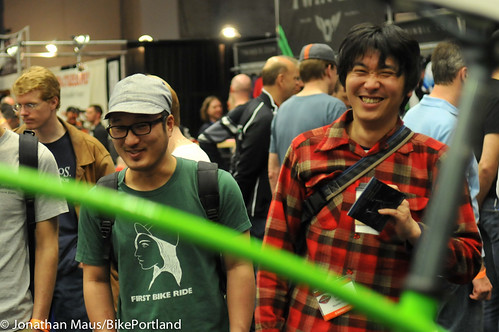
Coming to NAHBS is also important so his customers can tell the builders exactly what they want in a frame — and in the U.S., the builders actually listen. “American builders listen to customers,” says Tanaka, “Most keirin builders don’t listen to us. That’s the difference.”
Tanaka offers his customers not just access to American builders, but an education on materials.
For Tanaka, it’s all about steel. And when it comes to steel, he understands that there’s a big difference between off-the-shelf, production steel bikes, and a handmade bike made to fit by a master craftsman. After he began importing bikes from Soma (a popular U.S. brand made in Taiwan), he realized the ride was different than his DeSalvos. “When your ride, you can understand the difference,” is how he put it.
Tanaka isn’t a snob, he still imports a sizable amount of frames from brands like Surly and Soma. He also imports these lower-quality steel frames and repaints them. When I asked him why, he said, “People want red, or blue, or yellow… I’m always thinking about kids. They say, ‘I want to ride a blue bicycle!'”
Offering custom paint on lower-priced steel bikes isn’t just about customer service for Tanaka, He knows that some customers will start with a Surly, or a Soma, but will eventually graduate to a custom bike. “When people start riding a Surly,” he says, “this customer then goes up to Hunter, or IF [Independent Fabrication], or Cielo.”
Tanaka is far from the only person in Japan that’s interested in American-made bikes. Independent Fabrications has a distributor in Nobeyama, Moots Cycles has one in Osaka, and other custom builders — like Bend’s Vulture Cycles — have customers in Japan.
As for what’s driving this interest in high-quality, handmade steel bikes from America? It might be cultural. The Japanese, unlike their neighbors in China or South Korea, seem to have bucked the trend toward a throw-away culture that favors only the latest and greatest (this recent Wall St. Journal article, Made Better in Japan, might also shed light on the Japanese approach to consumer goods.)
It also might have something to do with Tanaka’s infectious enthusiasm and genuine love for these bikes and the people who build them.
As I finished up my conversation, Tanaka he thanked me for my time and was off to his next meeting. He had customers waiting for him — three men who traveled all the way from Japan to sample the finest steel bikes in the world.
— This is part of BikePortland’s special coverage of NAHBS 2012. Read more stories and browse more images here.





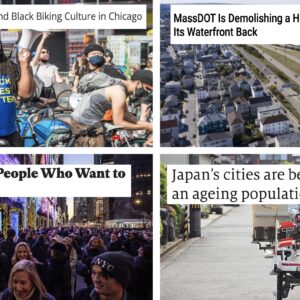
Thanks for reading.
BikePortland has served this community with independent community journalism since 2005. We rely on subscriptions from readers like you to survive. Your financial support is vital in keeping this valuable resource alive and well.
Please subscribe today to strengthen and expand our work.
I am very happy that Mr. Tanaka has helped generating excellent level of interest in hand-made bike frames, especially those from the US. I spent several years working largely with Japanese clients as a strategy consultants, so I have some familiarity in how American cultures and ideas appear and can attract Japanese people. I think the fact that these are from the US added an additional level of mystic to the frames, and the distance and the higher cost makes exclusivity by scarcity.
While the US definitely has a much larger pool of builders building custom frames, Japan is not completely devoid of them. Velo Orange had a blogpost several years past featuring a list of Japanese builders: http://velo-orange.blogspot.com/2007/01/japanese-frame-builders.html
While most of them have their roots in Keirin, at least a good number of them on that list makes racing, randonneuring, and city, and camping bikes today. Toei is famous in the randonneuring world. My wife and I each have an Ebisu that’s built by a builder not on that list. Perhaps US builders are more willing to work with their customers’ individual preferences, where Japanese builders tend to build frames based on well-established platforms, practices, and designs.
When I ordered my Ebisu several years ago, I found that the wait time (5 months) and the cost (at the time less than $1600 for a randonneur frameset with custom geometry, custom paint, and a matching front rack) was much more palatable than its US counterparts. Hiroshi (the proprietor of Jitensha Studio and the Ebisu brand) had his expertise, and some of my requests were deemed not appropriate for the frameset, but I am very happy with the results.
Really interesting article, thanks for sharing it!
Don’t forget Daisuke Yano too! Does huge business with IF- and puts on cyclocross races to boot. We’ve had Molly, Alexandra Burton, Heidi Swift and others go to his race in Nagano!
The Japanese are nuts for cool bicycles. I used to be Sales Manager for Bike Friday. They loved our bikes! They love cool technology; they love things that work, they love things that are different; they love things that are well made. A perfect market for custom frame-builders.
Yeah, the market for high-end consumer products in Japan is very robust. When I was there I saw lots of cool tracks bikes and stuff, modified for the urban environment.